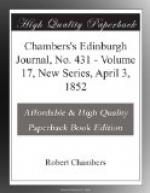There is always, even at noon, a buzz of animation in the little piazza of the Ponte—always a knot of worthies in loose brown holland coats and straw-hats, talking over every passing occurrence. The banker’s office, too, is situated here, and that is a lounge in itself—a sort of private committee-room for the discussing of any fresh piece of gossip, ere it is submitted for dissection to the public at large. The English banker has now become an important feature in all continental circles. The unsophisticated beings who, perchance, imagine his duties simply limited to cashing travellers’ bills, and discounting circular-notes, have now an opportunity of learning over how wide a field of action his arduous avocations must be spread. The English banker should be imperturbably good-tempered, active, and obliging; allowing no difficulties to dismay, no ungraciousness to offend him. His clients’ happiness, interest, comfort, and amusement are his engrossing thought; and if, after experiencing an infinity of trouble, rudeness, and vexation, his only return should be the half-percentage on a L.50 draft, he is expected to smile, be contented, and with undaunted resolution, pursue the same train of kindness and civility towards the next new-comer. The banker’s wife has also her line of tactics to pursue. She must call on all the influential families who bring letters of recommendation to her husband; listen with interest to all the detailed miseries of travelling with young children; and be sympathisingly anxious about little hopeful’s eyeteeth. She must be an adept at writing notes, and be possessed of an immense store of local information to supply the incessant inquiries with which she is assailed. She must also give tea-parties and dances, get partners for all the disengaged young ladies, and stand up herself, if necessary, to complete the quadrille. Finally, she must be above feeling any affront or mortification, and learn to consider herself in the light in which she is commonly regarded—a sort of machine pertaining to the bank: just as much a part of the establishment, in fact, as the iron money-chest which stands in the office, and created solely for the advantage and convenience of her travelling country-people.
When the continental banker happens to have no wife, in his own person must be united the attributes I have described; and with a beaming face, and frank shake of the hand, must he advance from his desk to greet every visitor who breaks in upon his hours of business. Let us take a peep, for instance, one July morning, into the bank.
Two or three old habitues are reading the newspapers; before them is a table on which are army and navy lists; notices of the arrivals and departures of the French and Peninsular Steam-Navigation Company’s packets from Leghorn; itineraries of the baths; cards of professors of various languages, &c. The banker is writing. Enter a lady; a boy, with turn-down collar and very red ears; a little girl in a nice hat; a Swiss bonne; and a baby, with a blue sash and feather.




